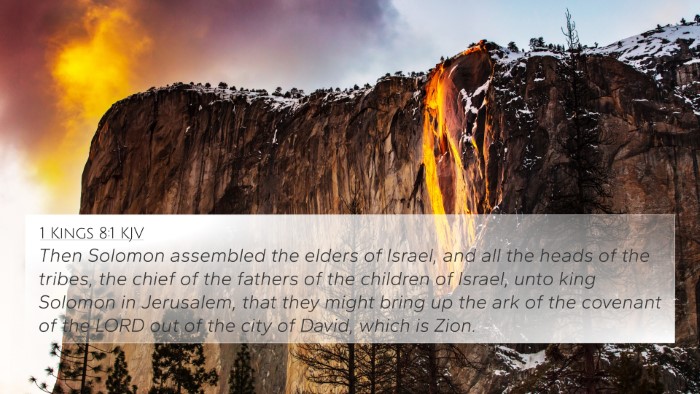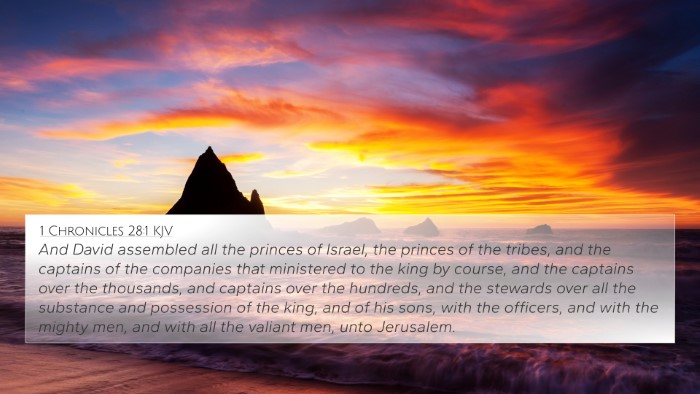Understanding 1 Kings 20:7
1 Kings 20:7: "Then the king of Israel called all the elders of the land, and said, 'Mark, I pray you, and see how this man seeketh mischief: for he sent unto me for my wives, and for my children, and for my silver, and for my gold; and I denied him not.'"
Summary of the Verse
This verse describes King Ahab's response to Ben-Hadad's demands, where he calls upon the elders of Israel to discuss the grave circumstances that he faces. The situation reflects issues of power dynamics, greed, and communal counsel in Israel’s governance.
Insights from Biblical Commentaries
-
Commentary by Matthew Henry
Matthew Henry emphasizes Ahab's perception of Ben-Hadad’s demands as a serious act of aggression. Ahab’s stance illustrates the sin of complacency that led to Israel's moral decline, as he lays before the elders the heavy burden imposed by Ben-Hadad's overwhelming requests for personal possessions, highlighting the tension of kingship and the people’s welfare.
-
Commentary by Albert Barnes
Albert Barnes elaborates on the implications of Ahab's inquiry to the elders; it shows the king recognizing the threat posed not just to his personal family but to the entire kingdom’s integrity. He notes the urgency and gravity in Ahab's appeal to his advisors, showcasing a moment of potential unity against a common adversary.
-
Commentary by Adam Clarke
Adam Clarke interprets this act as a failure of Ahab's leadership since he relies on counsel rather than taking a strong stand against Ben-Hadad himself. Clarke posits that the narrative sets the stage for Ahab’s character development and the eventual consequences of his indecisiveness.
Thematic Connections in the Bible
This verse connects with various themes throughout the Bible, including themes of leadership, responsibility, and the impact of greed and idolatry. Ahab's actions have threads running through both the Old and New Testaments, illustrating foundational truths about morality and the consequences of one’s choices.
Key Bible Cross-References
- 2 Chronicles 18:1-3 - Ahab's alliance with Jehoshaphat, demonstrating the political ramifications of his choices.
- 1 Kings 21:1-3 - Ahab's desire for Naboth’s vineyard illustrates his greed, relating to the context of this verse.
- James 4:2-3 - Discusses the consequences of desires that lead to conflict, echoing Ahab’s situation.
- Proverbs 16:18 - "Pride goes before destruction," relevant to Ahab's arrogance amid external threats.
- 1 Samuel 8:5-7 - The demand for a king parallels Ahab's struggles, shedding light on Israel's leadership issues.
- Matthew 10:34-36 - Christ speaks to the divisions even among families due to adherence to His teachings, reflecting on Ahab's own family threat.
- Ezekiel 18:30 - Calls for repentance parallel Ahab's need for wisdom in dealing with his situation.
- 1 Timothy 6:10 - The love of money as the root of evil aligns with the greed exposed in Ahab’s conduct.
- Galatians 6:7-8 - Reflects on the principle of sowing and reaping, hinting at the eventual fallout from Ahab’s actions.
- Romans 12:21 - A call to overcome evil with good, highlighting Ahab's missed moral choices response to Ben-Hadad.
Application and Reflection
This verse encourages believers to reflect on the dynamics of their relationships and the implications of their decisions. It reminds us of the interconnectedness of biblical narratives and encourages the use of Bible cross-reference guides to explore deeper meanings and lessons in scripture.
Tools for Bible Cross-Referencing
- Bible concordance - A vital resource for finding cross-references.
- Bible cross-reference guide - Helpful for identifying linking Bible scriptures.
- Cross-reference Bible study methods - Enhances understanding of thematic Bible verse connections.
- Bible chain references - Builds an understanding of how verses relate to each other.
- Comprehensive Bible cross-reference materials - Essential for thorough scriptural cross-referencing.
Conclusion
Understanding 1 Kings 20:7 through a comparative Bible verse analysis offers profound insights into the nature of biblical leadership, community responsibility, and the need for wise counsel in governance. By studying how this verse connects with other passages, believers can develop a richer understanding of biblical themes and their applications in today’s world.

















